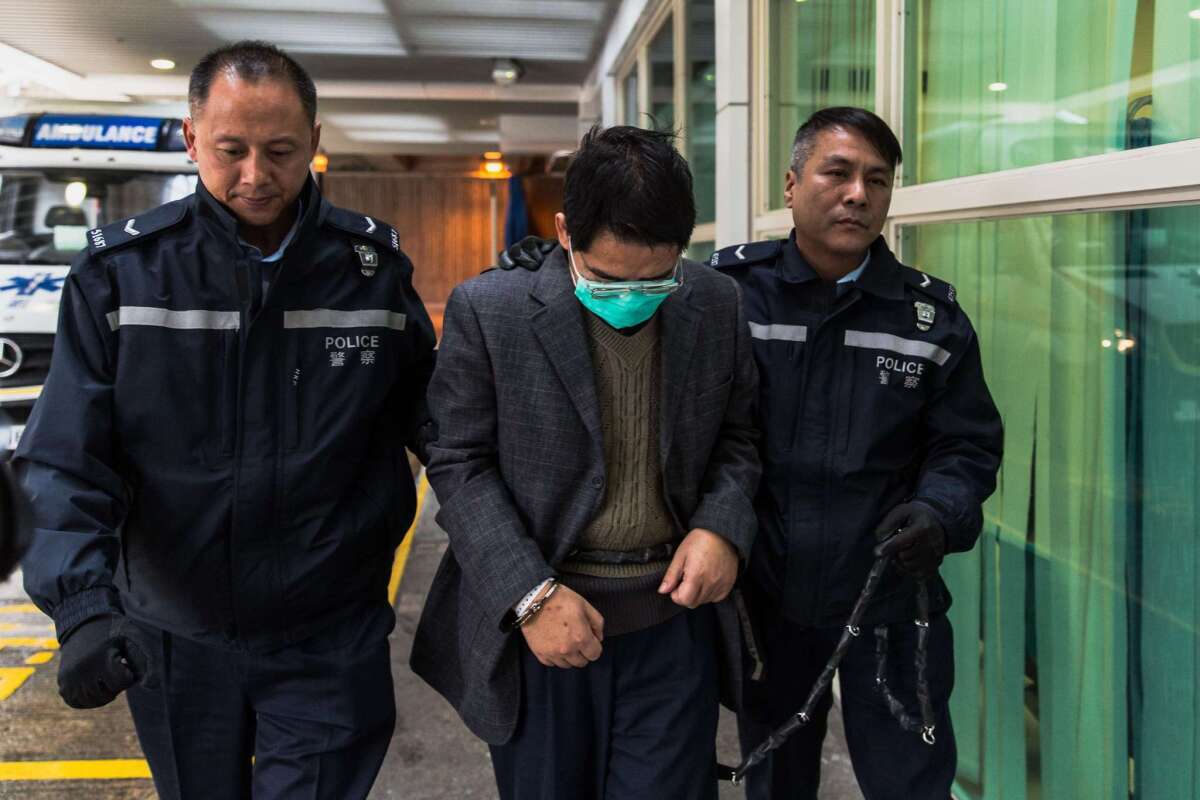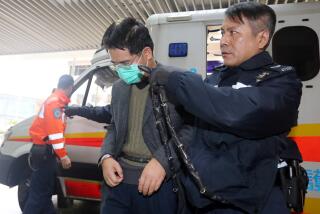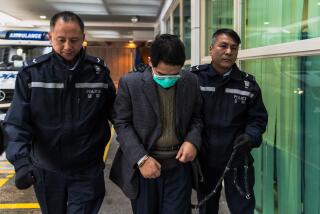Suspect in Arcadia double homicide denied bail in Hong Kong

Chinese national Deyun Shi, center, 44, accused of killing his two teenage nephews in the U.S., is escorted by police to a hospital in Hong Kong on Feb. 1, 2016, after he complained of feeling unwell when he appeared in court for a bail hearing.
- Share via
reporting from Hong Kong — The Chinese citizen suspected of killing his two teenage nephews in Arcadia last month was denied bail in Hong Kong while awaiting extradition.
Deyun Shi, 44, appeared in court in the semi-autonomous Chinese territory for a bail hearing, but a judge ruled against granting bail.
“I can’t see any special circumstance in this extradition proceeding” to grant bail, said Magistrate Lee Siu-ho, the presiding judge, adding that “there’s a real flight risk” on Shi’s part.
During the hearing, Shi questioned whether the Hong Kong court was acting independently or was prejudiced by the California authorities’ allegations against him.
“I hope my case wouldn’t be treated differently because the opposing party is the U.S. government,” said Shi, speaking Mandarin through an interpreter. “If the court is of the view that there’re reasonable grounds to deny bail,” Shi said, “I’ll give up.”
Anthea Li, the Hong Kong government counsel in the extradition case, argued that bail is regularly denied to local defendants suspected of the kind of serious crimes that Shi has been accused of.
Investigators with the Los Angeles County Sheriff’s Department have said that late Jan. 21 or early Jan. 22, Shi drove to his wife’s brother’s town house in the 400 block of Fairview Avenue in Arcadia after assaulting his estranged wife in La Cañada Flintridge.
Shi’s two nephews, 15 and 16, were found with extreme wounds at the Fairview residence on Jan. 22 by their mother, sheriff’s investigators say. She called 911 and the department later pronounced both teenagers dead at the scene from blunt-force injuries to their torsos.
Shi arrived in Hong Kong on Jan. 23 on a flight from Los Angeles and was immediately taken into police custody on a warrant issued based on a provisional arrest document from U.S. authorities. They have since initiated an extradition request for Shi, who has consented to return to face charges.
Hong Kong authorities say they are awaiting a full surrender request from their U.S. counterparts in order to execute the extradition in accordance with a 1997 treaty.
Appearing in court in Hong Kong last week, Shi denied he was a fugitive and said he flew to Hong Kong en route to a city in mainland China, where he owns businesses.
Shi apparently moved to Southern California in 2014 with his wife and two children. Recently, Shi’s wife had told him she wanted a divorce.
Monday morning’s hearing was adjourned for a few hours after Shi had told the judge he had health issues and was suffering from delusions.
“I feel many people are trying to kill me,” Shi said. “I’m very confused.… I don’t know what has happened to me over the past few days.”
On the judge’s order, Shi was taken to a hospital for a medical examination. He returned to the court in the afternoon and spoke for himself for the remainder of the proceedings, after dismissing the public defender that the judge had arranged to represent him.
Shi appeared dejected and listless. He often gave monosyllabic answers in a hoarse voice and was very soft-spoken; even his court interpreter at times strained to make out his responses.
The next hearing on the extradition proceedings is set for Feb. 11.
Law is a special correspondent.
ALSO
Jail escapees kidnapped cab driver, fought over whether or not to kill him
Detention of three journalists sparks backlash in China
In China, rise of Salafism fosters suspicion and division among Muslims
More to Read
Sign up for Essential California
The most important California stories and recommendations in your inbox every morning.
You may occasionally receive promotional content from the Los Angeles Times.










